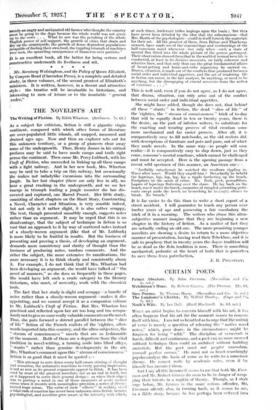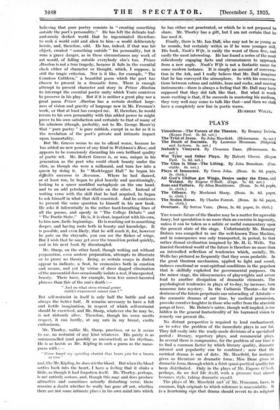CERTAIN POETS
WHEN an artist begins to concern himself with his art, it to often happens that his art' for the moment ceases to Concern itself with him. I am not so besotted as to urge thaftliewriti4 of verse' is merely a 'question of releasing the '" native wood notes," which, poor dears, in the circumstances might be forgiven for being " wild." The discipline of verseeraft is harsh, difficult and continuous, and a poet can no more succeed without technique than could an architect without building materials. But the • poet must not proper canendum, canendi perdere causes.' He must not so heart-searchingly psycho-analyse the basis of verse as to write to a conscious theory. He cannot write by academic rules, even if he
himself has invented them.
AndI say all this because-it seems to me that both Mr. Frees
man and Mr. Robert Gras:cS do seem to be in danger of wrap. ping their talents in a napkin of theory. Though, as I shall urge below, Mr. GraVes -the more serious offender, Md. Freeman offends also, in turning back, as it seems to me, to a Bible story, -because he has- perhaps been -seduced into
believing that pure poetry consists in " creating something outside the poet's personality." He his left the delicate leaf- and-muSIC 'decked world that he ingeminated therefore, to seek a world cold and alien to him—a world deliberately heroic, and, therefore, odd. He has, indeed, if that was his object, created " something outside " his personality, but it runs a grave danger, as in these circumstances any work of art would, of falling outside everybody else's too. Prince Absalom is not a true tragedy, because it fails in the essential clash either of character or thought, which, I suppose, is still the tragic criterion. Nor is it like, for example, " The Countess Cathleen," a beautiful poem which the poet has Chosen to present in a dramatic form. There is enough Attempt to present character and story in Prince Absalom to interrupt the essential poetic unity which Yeats contrives to preserve in his play. But if it is neither a great play nor a great poem Prince Absalom has a certain stedfast large- aess of vision and gravity of language new in Mr. Freeman's 'work, or that at least has escaped me. If, therefore, he would return to his own personality with this added power he might prove to his own satisfaction and certainly to that of many of his admirers (though, probably, not to Mr. George Moore's) that " pure poetry " is pure rubbish, except in so far as it is the revelation of the poet's private and intimate impact upon. immortality.
But Mr. Graves seems to me to offend worse, because he has added no new power of any kind in Welchman's -Hose, and appears to be conscjonsly discarding his own brilliant quality of poetic wit. Mr. Robert Graves is, or was, unique in his generation As the poet who could chuck beauty under the chin; as though she were a milkmaid, and turn her into a queen by doing it. In " Mockbeggai Hall " he began, his dijcilis ascensus in Avernum. Where he had danced, Or at least run, he began to plod heavily and questioningly, looking to a queer muddled metaphysic on the one hand, and to an odd petulant at sthetic on the other. Instead of Writing verse with the skill that he had acquired, he began to ask himself in what that skill consisted. And he continues to present the same question to himself in his new book. He asks it inferentially in the rather hard-breathing lines of all the poems, and openly in " The College Debate " and " The Poetic State." He is, it is clear, impatient with his own, to him now facile beginnings. He is reaching out to something deeper, and having roots both in beauty and knowledge. It is possible, and even likely, that he will reach it, for, however he puts on the chrysalis, you can see the flicker of wings. But I wish that he may get over the transition period quickly, And in his next hook fly disentangled.
Mr. Sharp, on the other hand, though writing not without preparation, even austere preparation, attempts to illustrate or to prove no theory. Being, as certain essays in dialect _ appear to indicate, a Scot, he economizes both in emotion and means, and yet by virtue of sheer dogged elimination of the unessential does occasionally isolate a real, if unexpected, beauty. There have, for example, been -less sunset-haunted phrases than this of the sun's death : - " And on what stem eternal grows
earth's evanescent sunset rose 1" But self-restraint in itself is only half the battle and not always the better half. It remains necessary to haVe a full and fertile imagination, in respect of which self-restraint should be exercised, and Mr. Sharp, whatever else he may be, is not riotously alive. Therefore, though his verse merits respect, it can hardly, at any rate in my breast, excite enthusiasm.
Mr. Thorley, unlike Mr. Sharp; practises, or so it seems to me, no restraint of any lcind whatever. His gaiety is as untrammelled (and possibly as uncorsetted) as his rhythms. He is as lavish as Mr. Kipling in such a poem as the name- poem with :— " Come board my speeding chariot that bears you for a brown or two "
and, like Mr. Kipling, he does stir the blood. But when the blood Settles back into the heart, I haVe a feeling that it slinks a little, as though it had forgotten itself. Mr. Thorley, perhaps, is not entirely serious, and, though this may and does produce attractive ,And sometimes actually disturbing verse, there remains a doubt .whether he really ha's gone all out, whether there are not some intimate places in his own mind into which he has either not penetrated, or which he is not prepared to share. Mr. Thorley has a gift, but 'I am not certain that he has used it. .
Finally, there is Mr. Ian who may not be as young as he sounds, but certainly writes as if he were younger still. His book, Noah's Wife, is easily the worst of these five,_ and easily the most interesting. He has found a series of the most ridiculously engaging facts and circumstances to approach from a new angle. Noah's Wife is not a fantastic name for some modern instance. It is simply an account of conversa- tion in the Ark, and I really believe that Mr. Dall imagines that he has conveyed the atmosphere. So with his- conversa- tions between cobras and rabbits, hens and cocks, and musical instruments—there is always a feeling that Mr. Dall may have supposed that they did talk like that. But what is much more exciting is that, if he succeeds in mastering his medium, they very well may come to talk like that—and then we shall have a completely new line in poetic wares.
HUMBERT WOLFE.



































































 Previous page
Previous page